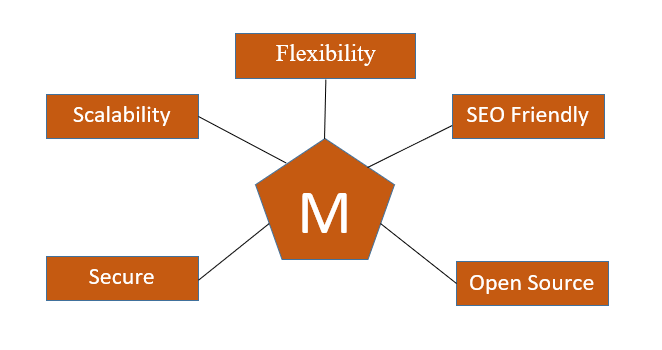Advantages and Disadvantages of Magento
Magento 2 Advantages and Disadvantages
Magento is the undisputed king of the eCommerce shopping cart. Many e-businesses vouch by its usefulness and rave its fully functional feature-rich eCommerce platform. According to a study conducted by built with .com, the number of websites using Magento from Mar 2016 to Feb 2017, the number of Magento websites enhanced by over 48000.
Built with another study observed that Magento is the most commonly used platform for Ecommerce.
Other platforms that follow close behind are Big-commerce, Shopify.

Advantages of Magento
Exclusively built for E-Commerce: Word press is good. But you cannot use it to create a business website. Similarly, even though Word press provides the plugins for eCommerce, it is Magento which is exclusively built for eCommerce. Mean you can use it as the right choice for the high volume online selling, loyalty program management, seamless payment, and checkout, etc.
SEO Edge Features: What business love about the framework is its unique Magento SEO features. You can use its amazing feature to help your product reach the top pages of Google. The SEO extension increase online visibility and reduces search engine optimization workload. It comes with SEO unique features like rich snippets, dynamically meta templates, etc.

Suit your business requirements: Interestingly, there are four editions to Magento, and each of these editions caters to some need or the other. The four are Magento community, Magento Enterprise Edition, Magento go, and Magento Enterprise premium. You can pick one of the meets of your particular business requirements. For example, very small to medium businesses with budget constraints can choose community edition as it is almost free. It is free to download and use.
Scalable: Being a developer-friendly framework, developers find it very easy to add pages and different features like linking and navigation. And it is written in PHP. It is very simple to scale too. Whenever you want to scale your application. The Scaling as and when required would let people use your eCommerce site during festivals and seasons without a hitch. Using Magento 2 would let you process 39% extra orders every hour and achieve faster server response time, according to their website.
Multiple store management possible: Before the advent of this platform, working and arranging different stores was practically impossible and unbelievably inconvenient. However, with Magento, you can easily arrange multiple stores through a single administrative panel. Most E-Commerce websites can now easily have stores in various languages.
Now, for example, if you plan to have two sites, one for selling adult beg and one for kid beg, you might want to share the data among these two. It can be easily possible with this enterprise-class E-Commerce solution.
As security is the main prerequisite for an E-Commerce website, this platform provide that as well, and hence worth mentioning here. Theft will not be able to steal your data quickly, and even if a hacker tries to do something, you can do something about it.
A horde of additional functionalities: The scripts come with several features, but you can still install several extra ones. There are several professionally written but responsible ones too. You have the option of going for the free version with its load of functionalities, or the period developed one with its high priority tech supports.
Disadvantages of Magento
Consumption of larger disk space: Whenever Magento go through heavy processes. It consumes larger disk space and memory. You will be needed to have a healthy hardware system to run this Software. Businesses using cloud services can also face problems during heavy processes.
Complex customized functionality: Magento is not meant for inexperienced users. Its customization features come with several real-time challenges. First, these features are very complex on their own and secondly. You need to appoint a professional Magento developer longer to time to come up with your desired customized functionality.
Could be Expensive: If you run a small shop, this platform might be a little costly. The costs that you will typically run to are ongoing maintenance costs, updates, changes to functionalities, plugin Software's, keeping the core code.
Costs will add up when you need to make additions to your websites, even if it is a small plugin. The enterprise edition of Magento is too costly, and so are the license fees. So you need someone who can handle changes to your website. Inexperienced people are likely to increase costs. Counter this disadvantage by hiring a development organization that knows how to do its job well.
- Slow: Magento is not effectively written in the PHP Zend framework, so this platform works by delaying eCommerce websites.
Resource Intensive: The platform is indeed scalable and robust, but that also makes it bulky and resource hungry. It needs massive servers, which also makes it slow, requires intensive data input if you need optimal performance, and puts in a lot of time to run it. However, this would be worth the investments if you are preparing a considerable store.
Need for a Proper Hosting Environment: In a shared environment, Magento may not work properly with this agreement. You buy a $ 25 semi-dedicated VPS server. The amount is due every month. If the host environment is not configured correctly, sooner or later.